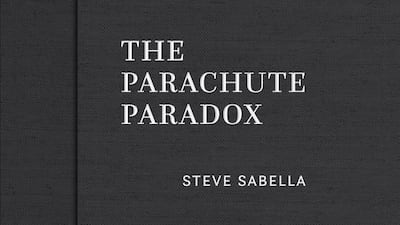The number of books about Israel and Palestine published every year can feel oppressive to the average reader. Coupled with the constant stream of news, it is clear that there is untappable desire for discussion about the conflict. Yet, new books tend follow the same patterns in terms of approach, construction and content. An in-depth history of one stage of the conflict, a compelling argument to achieve peace or, perhaps, a convincing strategy to challenge the status quo. On rare occasions, an original narrative of the conflict, imbued with honesty and sensitivity, is published.
Steve Sabella's memoir, The Parachute Paradox, is one such narrative, but it has flown under the mainstream radar. That might have something to do with its author and the unorthodox style of the book. Sabella is an artist from Jerusalem. His art, which has garnered him acclaim from Berlin to Dubai, wrestles with notions of identity in Palestine.
The Parachute Paradox is devoid of the pretension normally associated with conflict memoirs. Sabella doesn't have anything to prove with his story. As he describes his upbringing in Jerusalem's Old City and what life was like for his Christian family, Sabella is having a conversation with himself as much as with the reader. He floats between Palestine and Israel, but life in the seam creates more identity problems than it solves.
He is able to exist in many spaces – in West Jerusalem cafes with Israeli friends, in Jerusalem night clubs, in European art circles, in Gaza with Palestinian militants – but every new encounter pushes him further away from his true identity. He unpacks this search for meaning through a retelling of the last 30 years of fighting in Israel and Palestine. His quest for belonging, however, is satisfied in the form of his European wife, who he met in Jerusalem’s Old City. But even as they move to Europe and begin a family, the artist still feels ripped apart from his true identity. An identity that he seemingly can’t define.
There is no straightforward conclusion to this narrative. Sabella, as if instructed by a therapist to grapple with his identity issues through journaling – puts his story out for the reader to inspect as if it was a painting. The book itself comes packaged in a heavy cover that unfolds rather than opens in a traditional manner. Inside the cover is a bound book with no cover that demands the reader place the volume on a table and carefully leaf through its pages.
The insecurity of place and the lack of identity Sabella describes affects millions of Palestinians living under Israeli rule. These citizens (or residents, in the case of Sabella and other Arabs from East Jerusalem) are subjects of a state that doesn’t want them.
And yet, they are also looked at with suspicion from their own people.
While in Gaza on a photography assignment for the United Nations, Sabella and an Australian journalist are kidnapped by masked gunmen. The Palestinian gunmen demand Sabella’s identification card and then boast that they have captured an Israeli and an Australian, despite Sabella’s telling them in Arabic that he is a Palestinian. On being freed after the distressing encounter, he rushes to Ben Gurion airport in Tel Aviv to catch a flight to Europe. He is then subject to a three-hour interrogation by Israeli security agents, because to them, he is nothing more than a Palestinian security threat.
While there is no positive ending in this harrowing tale of life in the margins, Sabella has a remarkable ability to remain positive. His will to love is his ultimate redemption. He is passionate about his bond with his wife, he is in awe of the natural beauty of Jerusalem, and the birth of this daughter gives him a sense of purpose. The will to love allows him to overcome the crushing reality of having no firm place, no country or citizenship.
The book opens with an exhausted Sabella sitting on a flight to Europe after the interrogation at Ben Gurion. The artist recalls the time he went skydiving in Haifa. Hurdling through the air towards the Earth, he felt free and limitless. His quest for identity was the furthest thought in his mind until the parachute opened. For he was not jumping alone, he was in tandem with an Israeli instructor who pulled the chute.
"Over the years," he writes, "I've come to see this situation in the air as a metaphor for what it means to be a Palestinian living under Israeli occupation ... There is an Israeli on the back of every Palestinian, controlling all aspects of life. This impossible reality places the Palestinian under constant threat, in a never-ending hostage situation." He never resolves this oppressive reality, but in the course of The Parachute Paradox, Sabella discovers one aspect of life that Israel is yet unable to control: love.
Joseph Dana is an opinion writer at The National.

